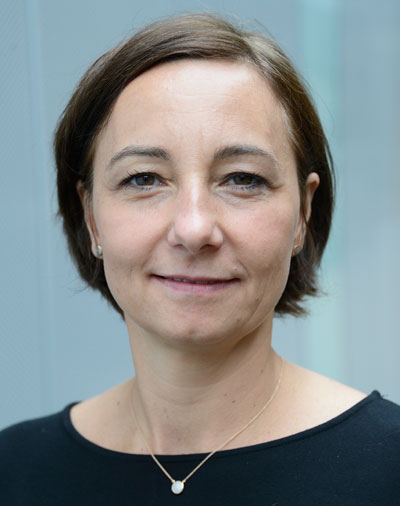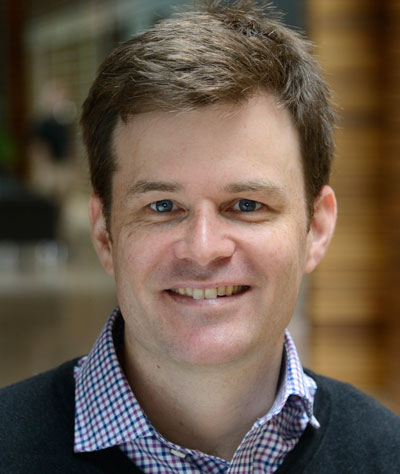Professor Nicole Soranzo and Dr David Adams elected to the Academy of Medical Sciences
Wellcome Sanger Institute Group Leaders Professor Nicole Soranzo and Dr David Adams are two of 48 world-leading scientists being honoured by the Academy of Medical Sciences for their outstanding contribution to biomedical science. David and Nicole were chosen from 410 candidates to join more than 1,200 existing Fellows whose innovative research is advancing understanding of health and disease and is benefitting society.
“Later this year the Academy will celebrate 20 years of supporting the translation of biomedical and health research into benefits for society. As we celebrate this special anniversary we stand at a crossroads of both enormous health challenges and great opportunity for medical sciences. So I am delighted to see the remarkable breadth and depth of the expertise within our 48 new Fellows. We look forward to these experts joining us in addressing the health challenges we face head on and exploiting opportunities to improve health in the UK and internationally.”
Professor Sir Robert Lechler PMedSci President of the Academy of Medical Sciences

As an example of this work, analysing data from the BLUEPRINT and UK Biobank projects, Nicole’s group has generated the most comprehensive to date map of genomic locations associated with the physical and molecular properties of blood cells. She further showed how these genetic differences are linked to increased risk of many common diseases, for instance cardiovascular diseases and autoimmune diseases such as asthma and rheumatoid arthritis. Finally, using high-resolution molecular analysis, she has shown how these data genetic data can informs the search of genes that can be targeted to treat the disease.
“I am honoured to be joining the Fellowship of the Academy of Medical Sciences. This award recognises the essential contribution of my talented research team, of the Sanger Institute research teams more broadly, as well as many worldwide colleagues who have empowered our genomic research by recruiting detailed information on the clinical and biological characteristics of our study populations. I am particularly grateful to the hundreds of thousands of volunteers who have selflessly gifted their time to enrich biomedical research. I will be delighted to continue to be able to contribute our results to open-access databases to benefit global research efforts.”
Professor Nicole Soranzo Group Leader at the Wellcome Sanger Institute and the University of Cambridge School of Clinical Medicine

The group have a particular focus on how melanoma, a type of skin cancer, evolves and has been analysing the genomes of families with a high incidence of this malignancy. The group also performs large-scale functional studies in cultured cells and in mice to understand how factors such as DNA mutations and the immune system influence tumour growth.
Using these approaches David’s team has identified new genes that regulate the spread of cancer. Targeting these proteins that the genes produce with drugs could offer new ways to help prevent metastases from forming.
“It is an honour to be recognised by the Academy of Medical Sciences. Untangling how cancer develops in cells and evolves requires an enormous collective effort. I am grateful for the dedication and creativity of my team and my colleagues as we work together to uncover cancer’s secrets. This award is as much theirs as it is mine.”
Dr David Adams Group Leader at the Wellcome Sanger Institute
Nicole and David will be formally admitted into the Academy at a ceremony on 27 June 2018.
More information
The Academy of Medical Sciences is the independent body in the UK representing the diversity of medical science. The Academy’s elected Fellows are the UK’s leading medical scientists from hospitals, academia, industry and the public service. Its mission is to advance biomedical and health research and its translation into benefits for society. We are working to secure a future in which:
- UK and global health is improved by the best research.
- The UK leads the world in biomedical and health research, and is renowned for the quality of its research outputs, talent and collaborations.
- Independent, high quality medical science advice informs the decisions that affect society.
- More people have a say in the future of health and research.
The work of the Academy focuses on four key objectives, promoting excellence, developing talented researchers, influencing research and policy and engaging patients, the public and professionals.
Selected websites
The Wellcome Sanger Institute
The Wellcome Sanger Institute is one of the world's leading genome centres. Through its ability to conduct research at scale, it is able to engage in bold and long-term exploratory projects that are designed to influence and empower medical science globally. Institute research findings, generated through its own research programmes and through its leading role in international consortia, are being used to develop new diagnostics and treatments for human disease. To celebrate its 25th year in 2018, the Institute is sequencing 25 new genomes of species in the UK. Find out more at www.sanger.ac.uk or follow @sangerinstitute
Wellcome
Wellcome exists to improve health for everyone by helping great ideas to thrive. We’re a global charitable foundation, both politically and financially independent. We support scientists and researchers, take on big problems, fuel imaginations and spark debate. wellcome.org


